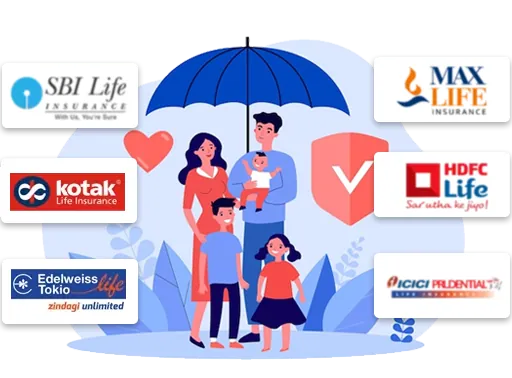- How Does It Work?
- Benefits and Drawbacks
- Term vs Permanent Insurance


A preferred option for many, permanent life insurance offers comprehensive coverage for an individual's entire lifespan. You can maintain coverage with permanent life insurance by continuing to pay premiums, whereas term life insurance only protects for a predetermined period of time. This provides lifelong protection to the policyholder. A payment for death benefits is made to the beneficiaries after the insured's demise. Over time, the cash value component expands.
There are various types of permanent life insurance available to those who want to opt for it. The different kinds of permanent life insurance policies include:
Providing coverage for an insured individual's entire lifetime, permanent life insurance requires premium payments to be made. This shows the breakdown of permanent life insurance:
Choose the right plan - Selecting the appropriate kind of permanent life insurance coverage that satisfies your requirements is the first stage in choosing a plan. Included in this are the different types of insurance like whole life, universal life and variable universal or variable term insurance. Different benefits and features apply to each type.
Deciding on the Coverage Amount - Deciding on the death benefit amount is crucial as it determines how much money your beneficiaries will get upon your passing. The death payout benefit usually does not incur taxes and may be applied to different expenses. The expenses take care of funeral costs, paying off debts that are still owed, and guaranteeing monetary stability for those you love
Premium Payment - To maintain the policy, it's necessary to regularly pay premiums. Permanent policies that provide coverage for the insured's entire lifetime are typically associated with higher premiums compared to term life insurance. A cash value component is part of permanent policies too.
Building Cash Value - The cash value component is a unique aspect of permanent life insurance. Part of the money paid as premiums goes towards accumulating the policy's cash value. The money in the account accumulates without any taxes being incurred because of tax-deferred growth.
Flexibility - Variable universal and variable life insurances are among some types of permanent policies that offer investment choices through the cash value portion. Policyholders have the flexibility to distribute their cash value across multiple investment account options like stocks, bonds or mutual funds. These investments' performance can affect both the cash value and the overall policy's worth.
Loans and withdrawal Options - Policyholders can choose to access the cash value of their policy through either policy loans or withdrawals. Borrowing against the cash value is possible with policy loans while keeping the policy in force. Interest on the loan is levied at a rate that's commonly below market standards. Reducing death benefits might be possible due to withdrawals that entail taking out some of the cash value and remaining unpaid
Guaranteed Death Benefit - The death benefit will be paid out to the policy's beneficiaries upon the insured's passing. The payout is generally tax-exempt and can be employed by the beneficiaries to meet any urgent expenses, clear debts or offer unceasing fiscal aid.
Term life insurance and permanent life insurance are two distinct types of life insurance, each with its advantages and considerations. Let's compare term vs permanent life insurance across various aspects:
| Point Of Difference | Term Life Insurance | Permanent Life Insurance |
| Coverage Period | Provides coverage for a specified term (e.g., 10, 20, or 30 years) | Provides coverage for the entire lifetime |
| Death Benefit | Pays out a death benefit to beneficiaries if the insured passes away during the policy term | Pays out a death benefit to beneficiaries regardless of when the insured passes away |
| Premiums | Typically lower premiums, especially for younger individuals | Generally higher premiums, but they remain the same throughout the policy duration |
| Investment Component and Cash Value | Does not have an investment component and does not accumulate cash value | Includes an investment component, allowing policyholders to grow cash value over time, which can be accessed through policy loans or withdrawals |
| Affordability | Generally more cost-effective for individuals seeking temporary coverage | May be more cost-effective for individuals with long-term coverage needs or those seeking to build cash value |
| Flexibility | Provides flexibility to choose the desired coverage term | Offers flexibility to adjust premium amounts, or access the cash value |
| Policy Renewal | May offer the option to renew the policy at the end of the term, but premiums may increase | No need for renewal as long as premiums are paid |
Permanent Life insurance, which lasts a lifetime, offers benefits like cash value accumulation and other financial perks. Higher premiums and complexities are associated with it but it also offers valuable benefits like estate planning and tax advantages. Term life insurance allows you to get insured at an affordable rate with no investment or savings element included. The decision of whether to choose permanent or term life insurance is dependent on individual circumstances including financial goals and priorities. A crucial step in securing your family's long-term financial future is consulting with a financial advisor and evaluating your needs.
Compare and buy the most suitable Life Insurance Plan from the below-mentioned IRDAI-approved Life Insurance companies.
4.6
Rated by 854 customers
Select Your Rating
Let us know about your experience or any feedback that might help us serve you better in future.


Daina is a content writer with a profound grasp of Insurance, Stocks, and Business domains. Her extensive 3-year experience in the insurance industry equips her with a nuanced understanding of its intricacies. Her skills extend to crafting blogs, articles, social media copies, video scripts, and website content. Her ability to simplify complex insurance concepts into reader-friendly content makes her an expert in the domain.
Do you have any thoughts you’d like to share?